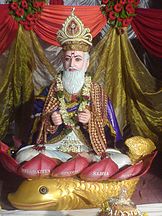
The Trimurti is the trinity of supreme divinity in Hinduism, in which the cosmic functions of creation, preservation, and destruction are personified as a triad of deities. Typically, the designations are that of Brahma the creator, Vishnu the preserver, and Shiva the destroyer. The Om symbol of Hinduism is considered to have an allusion to Trimurti, where the A, U, and M phonemes of the word are considered to indicate creation, preservation and destruction, adding up to represent Brahman. The Tridevi is the trinity of goddess consorts for the Trimurti.

Hindu deities are the gods and goddesses in Hinduism. Deities in Hinduism are as diverse as its traditions, and a Hindu can choose to be polytheistic, pantheistic, monotheistic, monistic, even agnostic, atheistic, or humanist. The terms and epithets for deities within the diverse traditions of Hinduism vary, and include Deva, Devi, Ishvara, Ishvari, Bhagavān and Bhagavati.

Avatar is a concept within Hinduism that in Sanskrit literally means 'descent'. It signifies the material appearance or incarnation of a powerful deity, or spirit on Earth. The relative verb to "alight, to make one's appearance" is sometimes used to refer to any guru or revered human being.

The Bhakti movement was a significant religious movement in medieval Hinduism that sought to bring religious reforms to all strata of society by adopting the method of devotion to achieve salvation. Originating in Tamilakam during 6th century CE, it gained prominence through the poems and teachings of the Vaishnava Alvars and Shaiva Nayanars in early medieval South India, before spreading northwards. It swept over east and north India from the 15th century onwards, reaching its zenith between the 15th and 17th century CE.
Bhakti yoga, also called Bhakti marga, is a spiritual path or spiritual practice within Hinduism focused on loving devotion towards any personal deity. It is one of the three classical paths in Hinduism which lead to moksha, the other paths being jnana yoga and karma yoga.

In the Hindu tradition, a murti is a devotional image, such as a statue or icon, of a deity or saint used during puja and/or in other customary forms of actively expressing devotion or reverence - whether at Hindu temples or shrines. A mūrti is a symbolic icon representing divinity for the purpose of devotional activities. Thus, not all icons of gods and saints are mūrti; for example, purely decorative depictions of divine figures often adorn Hindu temple architecture in intricately carved doorframes, on colourfully painted walls, and ornately sculpted rooftop domes. A mūrti itself is not God, but it is merely a representative shape, symbolic embodiment, or iconic manifestation of God.

The Vishnu Sahasranama is a Sanskrit hymn containing a list of the 1,000 names of Vishnu, one of the main deities in Hinduism and the Supreme God in Vaishnavism. It is one of the most sacred and popular stotras in Hinduism. The most popular version of the Vishnu Sahasranama is featured in the Anushasana Parva of the epic Mahabharata. Other versions exist in the Padma Purana, the Skanda Purana, and the Garuda Purana. There is also a Sikh version of the Vishnu Sahasranama found in the work Sundar Gutka.
Prayer is considered to be an integral part of the Hindu religion; it is practiced during Hindu worship (puja) and is an expression of devotion (Bhakti). The chanting of mantras is the most popular form of worship in Hinduism. The Vedas are liturgical texts. Stuti is an umbrella term for religious literary creations, but it literally means "praise."
Sampradaya, in Indian origin religions, namely Hinduism, Buddhism, Jainism, and Sikhism, can be translated as 'tradition', 'spiritual lineage', 'sect', or 'religious system'. To ensure continuity and transmission of dharma, various sampradayas have the Guru-shishya parampara in which parampara or lineage of successive gurus (masters) and shishyas (disciples) serves as a spiritual channel and provides a reliable network of relationships that lends stability to a religious identity. Shramana is vedic term for seeker or shishya. Identification with and followership of sampradayas is not static, as sampradayas allows flexibility where one can leave one sampradaya and enter another or practice religious syncretism by simultaneously following more than one sampradaya. Samparda is a Punjabi language term, used in Sikhism, for sampradayas.

The Smarta tradition, also called Smartism, is a movement in Hinduism that developed and expanded with the Puranas genre of literature. It reflects a synthesis of four philosophical strands, namely Uttara Mīmāṃsā, Advaita, Yoga, and theism. The Smarta tradition rejects theistic sectarianism, and is notable for the domestic worship of five shrines with five deities, all treated as equal – Ganesha, Shiva, Shakti, Vishnu and Surya. The Smarta tradition contrasted with the older Shrauta tradition, which was based on elaborate rituals and rites. There has been a considerable overlap in the ideas and practices of the Smarta tradition with other significant historic movements within Hinduism, namely Shaivism, Brahmanism, Vaishnavism, and Shaktism.
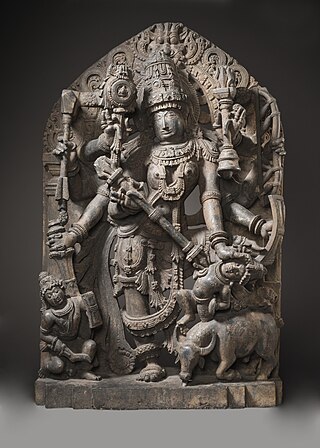
In Hinduism, there are diverse approaches to conceptualizing God and gender. Many Hindus focus upon impersonal Absolute (Brahman) which is genderless. Other Hindu traditions conceive God as bigender, alternatively as either male or female, while cherishing gender henotheism, that is without denying the existence of other gods in either gender.
The following list consists of notable concepts that are derived from Hindu culture and associated cultures’ traditions, which are expressed as words in Sanskrit or other Indic languages and Dravidian languages. The main purpose of this list is to disambiguate multiple spellings, to make note of spellings no longer in use for these concepts, to define the concept in one or two lines, to make it easy for one to find and pin down specific concepts, and to provide a guide to unique concepts of Hinduism all in one place.
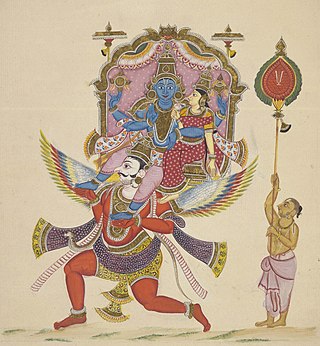
Lakshmi Narayana or Lakshmi Narayan is the dual representation of the Hindu deities Vishnu, also known as Narayana, and his consort, Lakshmi, traditionally featured in their abode, Vaikuntha. The goddess of wealth and prosperity, Lakshmi, is depicted as standing next to Vishnu, who holds the Panchajanya, Kaumodaki, Padma, and the Sudarshana Chakra. Another depiction of Lakshmi-Narayana portrays Lakshmi in the service of Narayana, who reclines on the cosmic serpent Shesha, floating in the Kshira Sagara, the Ocean of Milk.
Shanmata meaning "Six Sects" in Sanskrit, is a system of worship, believed in the Smarta tradition to have been founded by the Hindu philosopher Adi Shankara, whose lifetime was during circa 8th century CE. It centers around the worship of six primary deities of Hinduism: Shiva, Vishnu, Shakti, Ganesha, Surya, and Skanda. It is based on the belief in the essential oneness of all deities, the unity of Godhead, and their conceptualization of the myriad deities of India as various manifestations of the one divine power, Para Brahman.

Panchayatana puja also known as Pancha Devi Deva Puja is a system of puja (worship) in the Smarta sampradaya, which is one of four major sampradaya of Hinduism. It consists of the worship of five deities set in a quincunx pattern, the five deities being Ganesha, Adi Shakti, Shiva, Vishnu and Surya. Sometimes an Ishta Devata or Kartikeya is the sixth deity in the mandala.

Vaishnavism is one of the major Hindu denominations along with Shaivism, Shaktism, and Smartism. It is also called Vishnuism since it considers Vishnu as the sole supreme being leading all other Hindu deities, that is, Mahavishnu. Its followers are called Vaishnavites or Vaishnavas, and it includes sub-sects like Krishnaism and Ramaism, which consider Krishna and Rama as the supreme beings respectively.According to a 2020 estimate by The World Religion Database (WRD), hosted at Boston University’s Institute on Culture, Religion and World Affairs (CURA), Vaishnavism is the largest Hindu sect, constituting about 399 million Hindus.

A Banalinga is a stone of a type found in the riverbed of parts of the Narmada River in Madhya Pradesh state, India, formed by natural processes of erosion into a shape resembling a lingam, an aniconic form of the Hindu deity Shiva. They are smooth ellipsoid stones that are regarded as manifestations of the deity, based on either the scriptures or cultural traditions among the Hindus, particularly of the Shaivas and Smarta Brahmins.
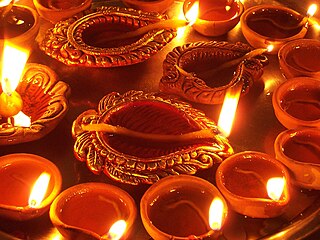
Worship in Hinduism is an act of religious devotion usually directed to one or more Hindu deities, invoking a sense of Bhakti or devotional love. This term is probably a central one in Hinduism, but a direct translation from the Sanskrit to English is difficult. Worship in Hinduism takes many forms, and its expression vary depending on geographical, linguistic, and cultural factors. Hindu worship is not limited to a particular place and Hindus perform worship in temples and within the home. It often incorporates personal reflection, music, dance, poetry, rituals, and ceremonies. Worship in Hinduism serves various purposes, including seeking blessings, guidance, or specific outcomes, as well as fostering a sense of inner peace and spiritual growth. It can also be an expression of devotion (bhakti) to the deity. The aim is to lead a pure life in order to progress spiritually and eventually attain liberation (moksha) from the cycle of rebirth.
Hindu denominations, sampradayas, traditions, movements, and sects are traditions and sub-traditions within Hinduism centered on one or more gods or goddesses, such as Vishnu, Shiva, Shakti and so on. The term sampradaya is used for branches with a particular founder-guru with a particular philosophy.
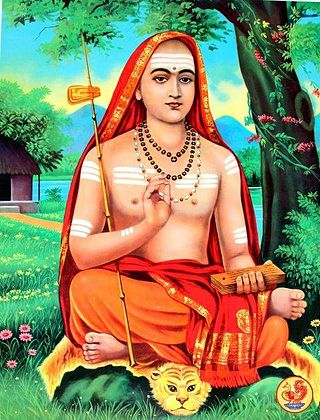
The Babburkamme are a community of Brahmins in southern India. They are followers of the Smarta tradition of Vedanta. They have held politically influential position such ministers, chief priests, scholars and poets under different kingdoms. A related community, today known as Uluchukamme, has Kannada as their mother tongue.


